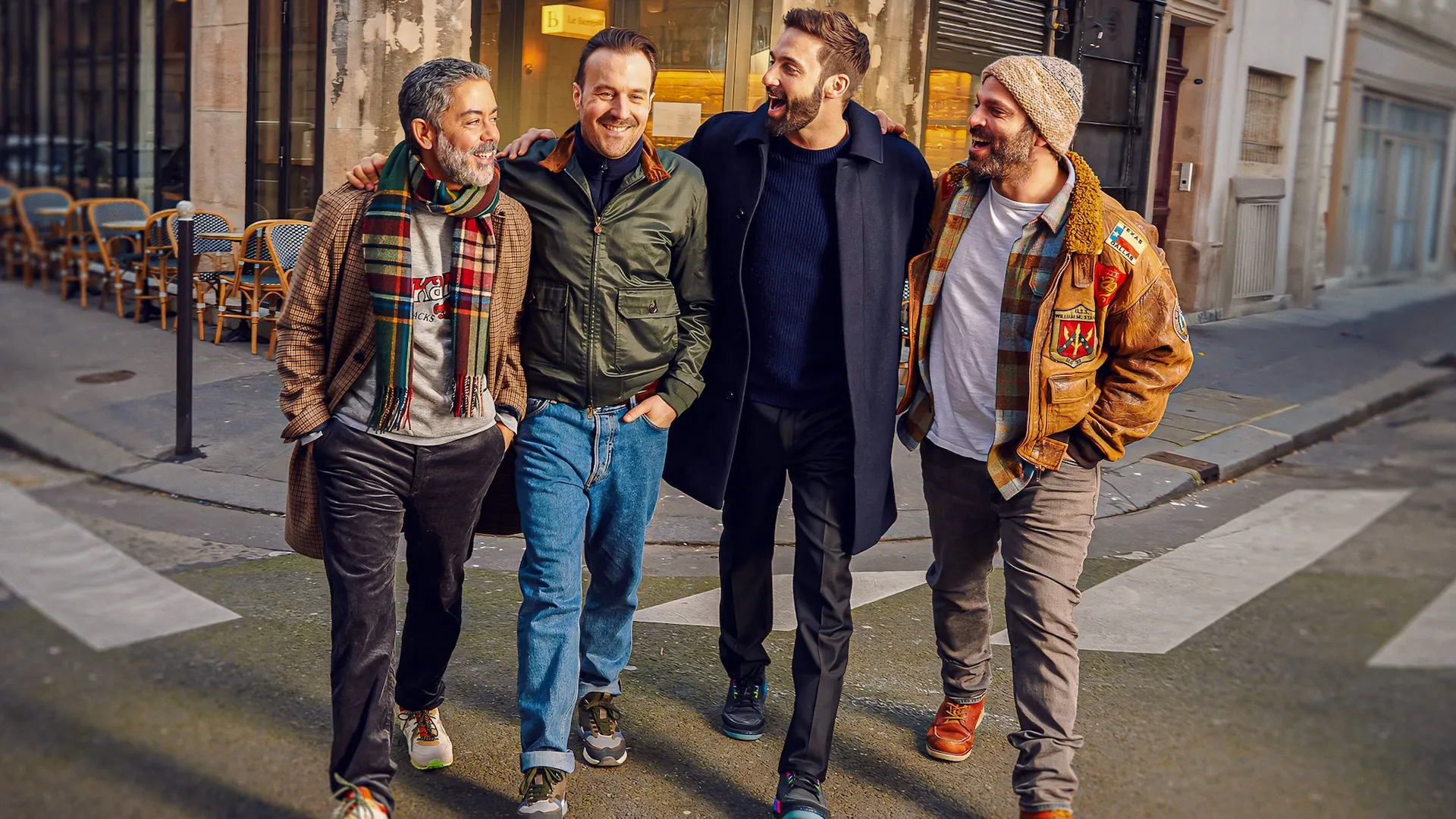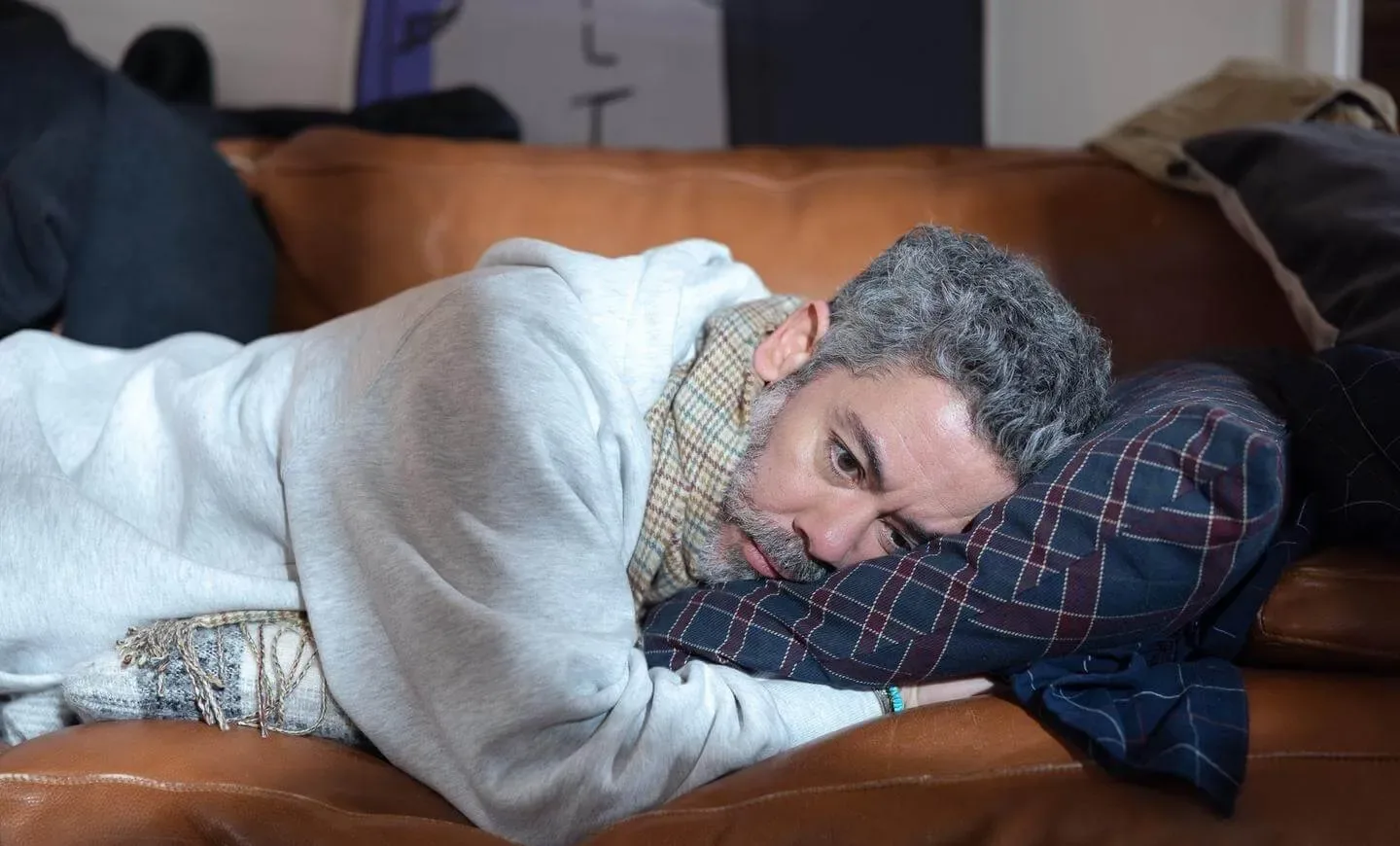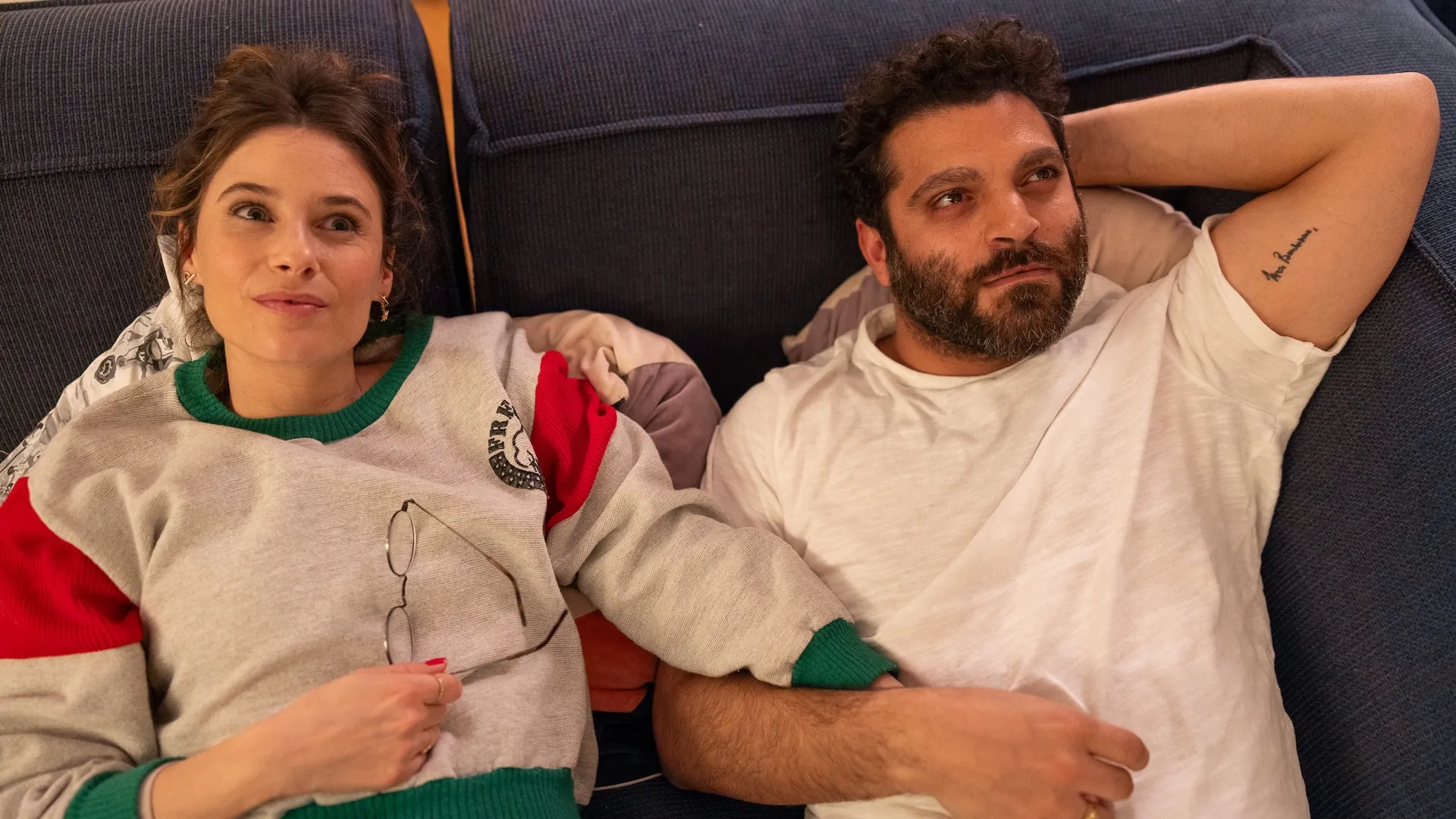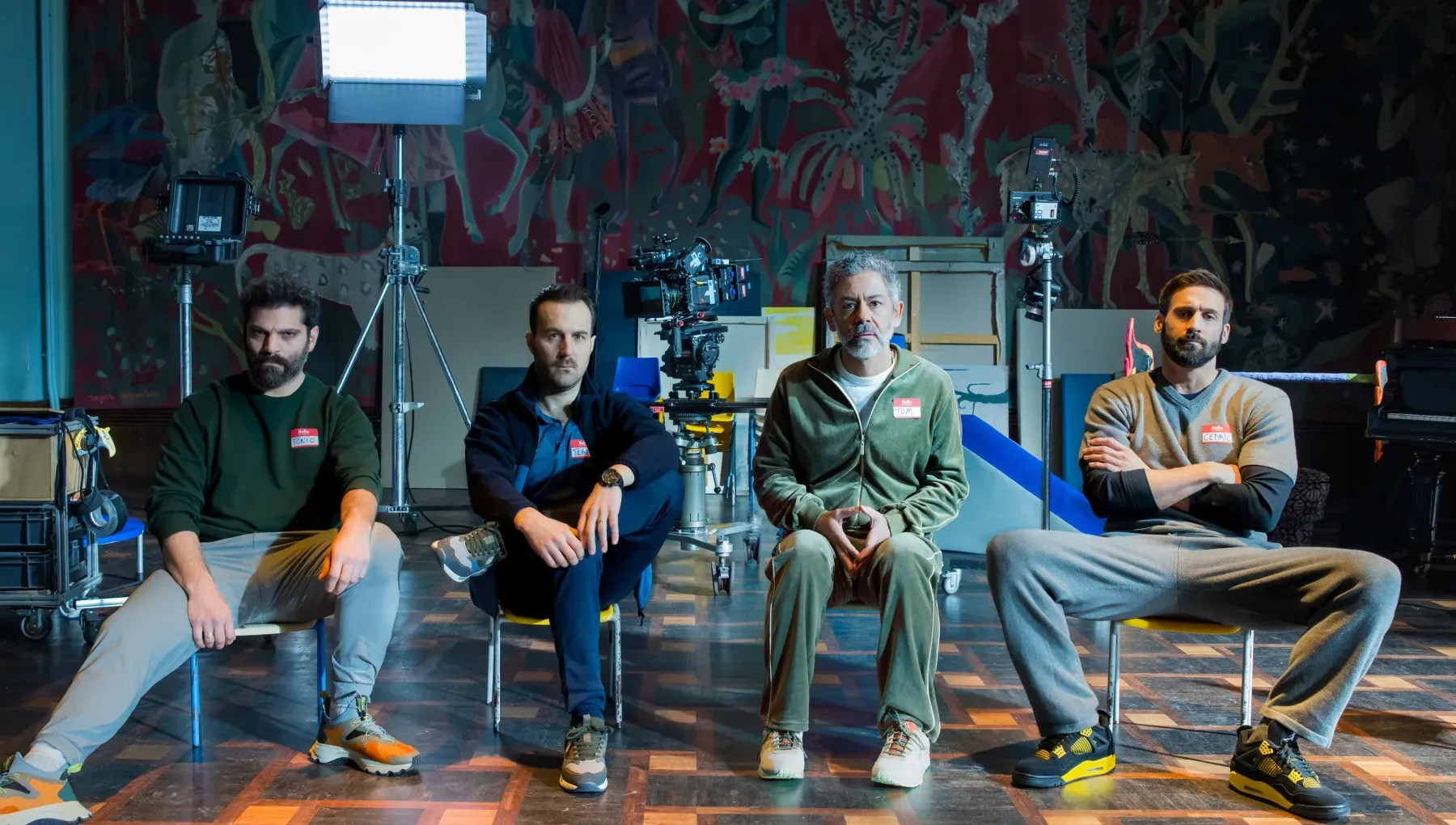Netflix’s Shafted (originally Super Males) explores the comedy of masculinity in crisis. Following four middle-aged friends—Cédric, Tom, Jérémie, and Tonio—the series examines their challenges with relationships, career setbacks, and changing gender roles in contemporary Paris. Each man, in his own way, feels disconnected from the current world, leading them to a court-mandated masculinity workshop meant to challenge their outdated attitudes.
The show’s concept intrigues—men compelled to face their worst impulses in an environment created to disassemble them. Cédric, a self-proclaimed dominant male, resents his female colleague’s promotion. Tom clings to his divorce like a trophy. Jérémie’s sense of masculinity wobbles under erectile dysfunction, while Tonio, a serial cheater, recoils when his girlfriend suggests an open relationship.
The humor shifts between cutting and exaggerated, occasionally delivering pointed social observations but frequently relying on physical comedy. The setup implies an exploration of gender dynamics, yet Shafted remains hesitant.
Rather than fully exposing its characters’ weaknesses, the show often softens them, transforming their struggles into jokes instead of substantial reflections. The result presents an uneven perspective on contemporary masculinity—unsure whether to criticize or empathize.
Unraveling Masculinity: Shafted’s Narrative and Structure
Shafted operates as a character study, using interconnected stories to explore four men caught in changing gender dynamics. The series uses a premise of men forced into a masculinity workshop for court-mandated rehabilitation, playing with time and perspective to highlight the characters’ self-deceptions.
The storytelling echoes the episodic style of works like Marriage Story or The Man Who Loved Women, structuring its six episodes as a series of personal challenges. Each episode shifts between past and present, revealing how the men reached their breaking points—Cédric’s workplace rebellion, Tom’s post-divorce struggle, Jérémie’s health challenges, and Tonio’s relationship hypocrisy. The show sketches the contradictory impulses defining masculinity in transition.
The approach doesn’t always succeed with the finesse of its influences. Flashbacks provide background but sometimes fail to deepen character understanding, often reinforcing existing perceptions.
The four protagonists receive individual attention, with emphasis on Cédric’s trajectory. Early episodes introduce their struggles: Cédric’s professional decline after resisting a female colleague’s influence, Tom’s rejection of his wife’s new relationship, Jérémie’s anxiety about his masculinity, and Tonio’s anger at his girlfriend’s suggestion of an open relationship.
Pacing reflects the characters’ emotional stagnation. Episodes focusing on the workshop—where participants confront their behaviors—feel most compelling. Other segments drift into crude comedy, feeling disconnected from the core narrative. The group’s final confrontation leaves much unresolved, suggesting growth as a slow, uncomfortable process.
Shafted effectively captures the sensation of being trapped between old and new identities. The men aren’t dramatically transformed but are left aware that change is necessary—a choice that may challenge viewers but remains true to the generational experience it explores.
Flawed Men in Freefall: The Character Arcs of Shafted
Cédric embodies toxic masculinity in crisis. Played by Manu Payet with perfect arrogance and hidden desperation, he represents a man who thrived on privilege, only to find the world shifting away from his unchecked ego. After storming out of his job when asked to share power with a female executive, he spirals into self-pity, refusing to acknowledge his role in his own downfall.
His character reveals a deep inability to recognize systemic changes. His resentment toward his wife Lena’s success as an influencer stems from a need for control. Cédric claims progressiveness while feeling threatened by women surpassing him. His misguided workshop philosophy exposes the absurdity of men viewing feminism as a personal attack.
Cédric reflects a recognizable male archetype dominating online discourse, challenging ideas of discrimination. He resembles a Jordan Peterson follower or Andrew Tate supporter, with the show uncertain whether to criticize or redeem him.
Tom represents emotional stagnation—a mopey, delusional cartoonist unable to accept his divorce. He remains convinced his ex-wife Andrea will return, dragging his teenage son into reconciliation fantasies. His scenes of social media obsession and drunken vandalism feel painfully authentic, revealing a man trapped between past and present.
Jérémie’s storyline feels underdeveloped. As a city bicycle cop, he dreams of joining mounted police to validate his masculinity. His erectile dysfunction becomes a symbol of lost confidence, which he attempts to resolve through testosterone treatments.
Tonio embodies relationship double standards. A serial cheater, he erupts when his girlfriend Delphine suggests an open relationship. His reaction reveals a complete inability to apply the same rules he imposes on others.
The women characters remain peripheral. Lena challenges Cédric’s ego, Andrea exists as an offscreen concept, and Delphine offers limited resistance to male hypocrisy. While Shafted attempts to critique male entitlement, it often falls short by centering male experiences at the expense of female perspectives.
Men Under the Microscope: Shafted’s Themes and Social Commentary
Shafted examines how certain men cling to outdated masculinity. The show tracks four male archetypes—Cédric’s wounded pride, Tom’s romanticized self-pity, Jérémie’s virility crisis, and Tonio’s double standards—through a court-mandated masculinity workshop.
The workshop serves as a controlled environment exposing character contradictions. Shafted leans toward broad humor instead of psychological exploration. Unlike Ruben Östlund’s Force Majeure, which ruthlessly deconstructs male ego, the show rarely reaches deep critique.
The series attempts to balance gender dynamics by avoiding complete vilification of its male characters. Characters remain somewhat likable despite their flaws, revealing behaviors stemming from ingrained entitlement.
Feminism appears as a background context without substantial exploration. Female characters like Lena, Andrea, Cecile, and Delphine challenge their partners but lack independent narrative space.
Self-delusion emerges as a central theme. Characters perceive themselves as victims rather than acknowledging personal responsibility. Cédric frames job loss as discrimination, Tom sees his ex-wife’s happiness as betrayal, and Tonio erupts with hypocritical outrage over relationship boundaries.
Humor effectively exposes male privilege’s deep roots. Characters struggle with power dynamics in romantic, professional, and sexual relationships. Their reactions to vulnerability reveal complex emotional landscapes.
Peak comedic moments emerge from relationship tensions—Cédric’s disintegrating marriage, Tom’s desperate reconciliation attempts, and Jérémie’s masculinity obsession. Shafted captures male insecurity through exaggerated yet recognizable behaviors.
Comedy in Crisis: The Humor of Shafted
Comedy unpacks social change, and Shafted attempts to satirize masculinity in transition. The show moves between slapstick and social critique, blending styles reminiscent of French farce and comedic workplace dramas.
The strongest moments reveal characters’ internal contradictions. Cédric delivers self-righteous speeches about masculinity while his life crumbles. Jérémie’s testosterone insecurities create humor that feels pointed yet sympathetic. The satire struggles to deeply examine the systems creating these characters.
Discomfort drives much of the show’s humor, exploring relationships, sexuality, and social expectations. The masculinity workshop scenes generate genuine comedic tension. Some moments rely too heavily on shock value.
Sexual challenges and relationship failures dominate the comedic landscape. Jérémie’s erectile dysfunction subplot and Tom’s drunken reactions to his ex-wife feel underdeveloped. These elements hint at deeper commentary but often settle for easy laughs.
Peak comedy emerges when characters’ self-delusions play out naturally. Tonio’s explosive reaction to his girlfriend’s open relationship suggestion perfectly captures male entitlement. Workshop scenes shine when participants misinterpret therapy exercises through self-serving logic.
Some comedic attempts fall flat. Crude humor often lacks nuanced wit, occasionally feeling mean-spirited instead of insightful. The show struggles to balance critique with entertainment, missing opportunities for sharper social commentary.
Style Over Substance? The Technical Craft of Shafted
Shafted’s comedic strength lies in its cast’s performances. Manu Payet portrays Cédric with remarkable depth, blending arrogance and vulnerability. He captures a man believing the world opposes him, making the character simultaneously frustrating and engaging. Antoine Gouy’s Tom leans into physical comedy and melancholic absurdity, occasionally risking caricature.
Olga Kurylenko shines as Cédric’s wife Lena, providing grounded realism against exaggerated male behaviors. Mélanie Bernier’s Delphine challenges Tonio’s hypocrisy with effortless coolness. Female characters gain dimension through skilled performances despite limited script development.
Cinematography appears polished yet conventional. Paris serves as a passive background rather than an active element. The visual approach remains safe, missing opportunities for dynamic storytelling typical of French cinema.
Production design subtly reinforces character struggles. Cédric’s deteriorating home reflects his personal chaos, while Tom’s empty apartment mirrors his emotional state.
Director Noémie Saglio demonstrates skill in situational comedy. Her background in satirical work surfaces through ensemble interactions. The show wavers between sharp social commentary and broad physical humor, creating tonal inconsistencies.
Saglio captures modern masculinity’s discomfort but hesitates to deeply examine its complexities. Characters receive gentle treatment, avoiding intense personal confrontations. The direction remains competent yet ultimately cautious.
Where Shafted Stands and Where It Could Go Next
Shafted explores masculinity through comedy, with powerful performances by Manu Payet as self-destructive Cédric and Mélanie Bernier as cool Delphine. The series tracks cultural anxieties, positioning characters as outdated figures struggling against changing social landscapes.
The show wrestles with tonal challenges. Its approach wavers between critical analysis and broad comedy, leaving key themes unexplored. Female characters feel peripheral despite skilled acting. Raunchy humor occasionally undermines potential social commentary.
Character arcs remain incomplete. Cédric clings to wounded pride, Tom drowns in personal delusions, and Tonio slowly recognizes his hypocrisy. Each protagonist stands at a potential turning point, unresolved and conflicted.
Dark comedy enthusiasts might appreciate the series’ character-driven approach. Viewers familiar with European character studies will recognize the show’s sensibility. The narrative speaks to male emotional fragility through uncomfortable humor and social critique.
The series presents complex emotional territories without offering simple resolutions. Performances elevate material that might otherwise feel shallow or predictable. Viewers seeking straightforward storytelling may find the show’s nuanced approach challenging.
The Review
Shafted Season 1
Shafted explores French masculinity through comedy, balancing social commentary with irreverent humor. Four men confront their outdated gender perceptions during a mandatory workshop, revealing complex emotional landscapes. The series oscillates between critical observation and comedic exaggeration.
PROS
- Manu Payet and the supporting cast elevate the material.
- Explores masculinity in a changing cultural landscape.
CONS
- Struggles to balance satire with slapstick.
- Women serve more as foils than fully fleshed-out individuals.
- Doesn’t fully commit to its critique of toxic masculinity.
- Some crude jokes feel unnecessary and detract from the message.
- Leaves character arcs unfinished, making it feel incomplete.





















































